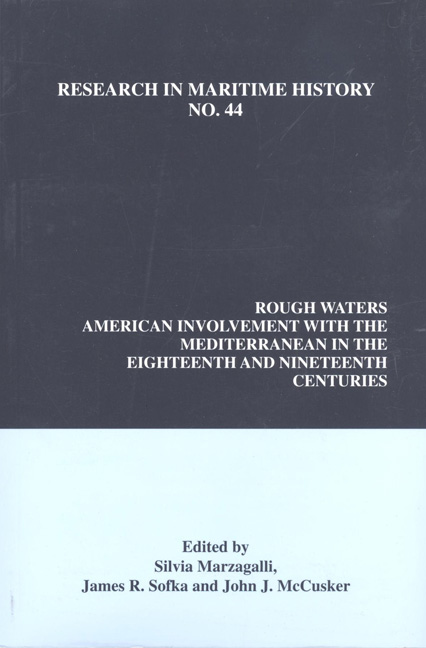Book contents
- Frontmatter
- Contents
- About the Editors
- Contributors' Notes
- “Rough Waters: American Involvement in the Mediterranean in the Eighteenth and Nineteenth Centuries: An Introduction”
- “Worth a War? The Importance of the Trade between British America and the Mediterranean”
- “Relations between North America and the Italian Peninsula, 1763-1799: Tuscany, Genoa and Naples”
- “American Shipping into the Mediterranean during the French Wars: A First Approach”
- “Notes toward a Franco-American Mediterranean 'From Below'”
- “Consuls and Consiglieri: United States Relations with the Italian States, 1790-1815”
- “Old and New Republics: Diplomatic Relations between the Republic of Genoa and the United States of America”
- ‘“From the Halls of Montesuma, to the Shores of Tripoli:’ Antoine Zuchet and the First Barbary War, 1801-1805”
- “Minorca: The First United States Naval Base in the Mediterranean and the American Consulate at Port Mahon”
- “‘The Jeffersonian Idea of National Security’ Revisited”
- “The Reluctant Warrior: Thomas Jefferson and the Tripolitan War, 1801-1805”
- “Slavery as Social Mobility? Western Slaves in Late Eighteenth Century Algiers”
- “Americans in the Mediterranean in the Late Eighteenth and Early Nineteenth Centuries: Concluding Remarks”
“Worth a War? The Importance of the Trade between British America and the Mediterranean”
- Frontmatter
- Contents
- About the Editors
- Contributors' Notes
- “Rough Waters: American Involvement in the Mediterranean in the Eighteenth and Nineteenth Centuries: An Introduction”
- “Worth a War? The Importance of the Trade between British America and the Mediterranean”
- “Relations between North America and the Italian Peninsula, 1763-1799: Tuscany, Genoa and Naples”
- “American Shipping into the Mediterranean during the French Wars: A First Approach”
- “Notes toward a Franco-American Mediterranean 'From Below'”
- “Consuls and Consiglieri: United States Relations with the Italian States, 1790-1815”
- “Old and New Republics: Diplomatic Relations between the Republic of Genoa and the United States of America”
- ‘“From the Halls of Montesuma, to the Shores of Tripoli:’ Antoine Zuchet and the First Barbary War, 1801-1805”
- “Minorca: The First United States Naval Base in the Mediterranean and the American Consulate at Port Mahon”
- “‘The Jeffersonian Idea of National Security’ Revisited”
- “The Reluctant Warrior: Thomas Jefferson and the Tripolitan War, 1801-1805”
- “Slavery as Social Mobility? Western Slaves in Late Eighteenth Century Algiers”
- “Americans in the Mediterranean in the Late Eighteenth and Early Nineteenth Centuries: Concluding Remarks”
Summary
This essay argues that the period after the Peace of Paris in 1783 was marked not by the start of American involvement in the Mediterranean but by its revival. Many studies of the economy of early British America demonstrate the long-standing existence of trade between the Thirteen Continental Colonies and Mediterranean Europe but offer little detail. The reasons for the omissions and confusions are several and understandable, but the fact is that the connections were venerable, considerable and increasingly vital to the early American economy. Perhaps the most powerful evidence of the importance of this longterm trade in the minds of Americans was their decision to wage war to defend it.
To begin where the story paused, on the eve of the War of Independence, appendix 1 presents estimates of the colonial balance of payments for the five-year period 1768-1772, a quinquennium significant not only because it is the only time for which we have sufficient data to engage in this exercise but also because it is arguably when the Continental Colonies had reached the top of their economic game. There are several difficulties with this table for this essay – some of which will be addressed later – but if we accept these data for present purposes, appendix 1 indicates just how crucial trade with the Mediterranean region had become for Americans by 1775.
Two points of particular consequence can be noted in the appendix. Exports from the Thirteen Continental Colonies to “Southern Europe and the Wine Islands” – otherwise called “Southern Europe” – amounted to nearly fifteen percent of all colonial exports (the “visibles” in the current account). The value of the trade was critical in itself, but it was even more so because the colonists imported much less by value from Southern Europe than they exported to the region by a ratio of more than six to one. Colonial exports to the Mediterranean earned the colonists some £358,000 sterling in net credits.
Contemporaries recognized the nature and significance of this imbalance. As one commentator wrote in Gaine's Universal Register for the Year 1776 about a prime component of that trade, “the great Fishery of Cod carried on upon…the Banks of Newfoundland” was about more than exports.
- Type
- Chapter
- Information
- Rough WatersAmerican Involvement with the Mediterranean in the Eighteenth and Nineteenth Centuries, pp. 7 - 24Publisher: Liverpool University PressPrint publication year: 2010

